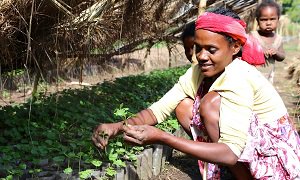BioCarbon Fund grant to combat climate change

Nespresso has today announced a joint investment of $6 million with the World Bank’s IFC (International Finance Corporation) in a landmark collaboration project to support coffee farmers in East Africa to combat the effects of climate change.
The investment is the latest made through the Nespresso Sustainability Innovation Fund, a vehicle to facilitate investment by Nespresso in innovative sustainability initiatives that go beyond its usual business operations. The investment includes a $3 million grant from the Bank’s BioCarbon Fund Initiative for Sustainable Forest Landscapes - its first ever private sector collaboration to finance an environmental initiative by a business.
This project, part of Nespresso’s AAA Sustainable Quality™ Program, will work with more than 40,000 smallholder coffee farmers in several regions of Ethiopia and Kenya to provide technical and financial support to increase sustainable practices and plant trees on their land. Reforestation of this kind helps to make farms more resilient to climate change. The farmers will also receive training in agricultural best practices to help them improve their productivity and the quality of their coffee harvests – enabling them to earn more money.
Jean-Marc Duvoisin, CEO of Nespresso, said: “This joint initiative is a good example of how industry and the public sectors can work together to support the sustainable development of coffee farming. Improving productivity and the quality of coffee harvests is a triple win - benefiting our customers, the environment and paving the way to higher incomes for farmers.”
IFC Director of Global Industries, Alzbeta Klein, said: “IFC has been working with Nespresso for several years, and together we recognize the potential of the AAA program as a business-led development tool. Projects like this are game-changers for smallholder farmers, giving them the opportunity to invest in their coffee plantations, become more productive and sustainable, and become part of a global supply chain.”
One of the areas to benefit will be Oromia, the largest regional state in Ethiopia and also the state with the greatest forest cover. This region, where the BioCarbon Fund’s program is based, lies in the heart of the ‘cradle of coffee’ and has seen widespread deforestation, causing the landscape to become degraded and increasing its vulnerability to the impacts of climate change. Farming has been a major contributing factor to this deforestation.
“This milestone achievement is an example of how partnerships between the public and private sectors working together can reach more communities and establishes a model for us to build on for years to come,” said John Roome, Senior Director for Climate Change at the World Bank. “The first-of-its-kind collaboration is based on shared goals of ensuring a ‘greener’ approach to planting and processing, higher productivity for farmers, and making the coffee industry in Ethiopia more resilient to climate change.”
The Nespresso Sustainability Innovation Fund (NSIF) was established to facilitate such partnerships and co-investment between the company and both public and private sector organizations. Initially the NSIF scope is focused on the revival of specific coffee origins, the resilience of coffee communities and landscapes. Going further, it will also explore opportunities in recycling and the circular economy.
The project will be implemented on the ground in collaboration with TechnoServe, an international non-profit organization and a long-time partner of both Nespresso and the IFC. It builds on the success of the Nespresso AAA Sustainable Quality™ Program across East Africa, including the launch this week of the SULUJA ti South Sudan, a Limited Edition Nespresso Grand Cru. SULUJA ti is the result of efforts to revive the coffee industry in South Sudan, helping farmers to improve their incomes and diversifying the economic base of the country.
